
IN THIS EXCITING NEW BOOK, renowned ethicist Richard A. Spinello offers the first comprehensive presentation of the late John Paul IIs great moral vision. Here admirers may read and understand the essential teachings of the pope in his own words as Spinello draws on his extensive research into John Paul IIs writings and speeches. Subjects covered include reverence for life, concern for the poor and suffering, moral law, conscience, moral choice, intrinsically evil acts, freedom, and goodness.
The purpose or this book is twofold: it not only persuasively presents the late popes vital teachings, but also defends them against his critics. This important new work preserves and promotes the extraordinary legacy of John Paul II by focusing on his championing of universal human dignity and objective moral truths.

The author gratefully acknowledges permission from Libreria Editrice Vaticana to quote from the encyclicals, and other papal documents of Pope John Paul II,
Published by Sheed & Ward
An imprint of Rowman & Littlefield Publishers, Inc.
A wholly owned subsidiary of The Rowman & Littlefield Publishing Group, Inc.
4501 Forbes Boulevard, Suite 200
Lanham, MD 20706
Estover Road
Plymouth PL6 7PY
United Kingdom
Distributed by National Book Network
Copyright 2007 by Rowman & Littlefield Publishers, Inc.
All rights reserved. No part of this publication may be reproduced, stored in a retrieval system, or transmitted in any form or by any means, electronic, mechanical, photocopying, recording, or otherwise, without the prior permission of the publisher.
British Library Cataloguing in Publication Information Available
Library of Congress Cataloging-in-Publication Data
Spinello, Richard A. The genius of John Paul II : the great popes moral wisdom /
Richard A. Spinello.
p. cm.
Includes bibliographical references and index.
9781461635406
1. John Paul II, Pope, 19202005. 2. Christian ethicsCatholic authors.
3. Catholic ChurchDoctrinesHistory20th century. I. Title.
BJ1249.S637 2006
241.042092dc22
2006017192
Printed in the United States of America
 The paper used in this publication meets the minimum requirements of American National Standard for Information SciencesPermanence of Paper for Printed Library Materials, ANSI/NISO Z39.48-1992.
The paper used in this publication meets the minimum requirements of American National Standard for Information SciencesPermanence of Paper for Printed Library Materials, ANSI/NISO Z39.48-1992.
Dedicated to the Most Reverend Lawrence J. Riley S.T.D.
19142001
Table of Contents
Acknowledgments
I AM ESPECIALLY indebted to my wife, Susan T. Brinton, for her work in typing and editing major portions of this book. Her moral support and encouragement during the writing of this book have also been invaluable. I also wish to thank Boston College for its ongoing support for my scholarship. Special thanks to Joyce OConnor and Sandra Howe of the Carroll School of Management for helping me to handle the logistics of manuscript preparation.
Thanks are due to my editor at Sheed & Ward, John Loudon, for his enthusiastic support for this project. Special thanks also to Sarah Johnson and Sheila-Katherine Zwiebel for their cooperation and assistance.
Like all scholars, I have stood on the shoulders of giants in order to research and write this book. In this case, the giants have been moral theologians and philosophers who helped me to appreciate the subtleties of natural law philosophy I have relied heavily on the work of Germain Grisez, John Finnis, Patrick Lee, and William May. I also want to single out the magnificent philosophical works of Father Norris Clarke, S.J., which are cited throughout this book. Father Clarke, a true pioneer in the work of Saint Thomas Aquinas, taught me Thomistic philosophy at Fordham University many years ago, and I can still remember his infectious enthusiasm for the thought of this great saint.
I wish to thank in a special way the Sisters of the Precious Blood at the Monastery of the Precious Blood in Manchester, New Hampshire, along with the nuns of Our Lady of the Angels Monastery in Hanceville, Alabama. I am quite sure that their prayerful support has led to the successful completion and publication of this book.
Finally, the book is dedicated to the memory of Bishop Lawrence J. Riley S.T.D., a former auxiliary bishop for the Archdiocese of Boston. Bishop Riley was a close friend and an exemplary spiritual leader of this archdiocese. In his quiet and unassuming way he bore witness to the demanding life of the Gospel throughout his distinguished career as priest, scholar, and teacher. He inspired many of the faithful in this city with his deep faith, his holiness, his keen intelligence, and his unrivaled rhetorical skill. Bishop Riley was a noted moral theologian in his own right and wrote a book called The History, Nature and Use of Epikea in Moral Theology, published in 1948 by Catholic University of America Press. It is fitting, therefore, that this modest work on Pope John Paul IIs moral theology will in some small way honor his memory.
Bishop Riley was one of many holy priests who have dutifully served the Catholic Church at my parish, Most Precious Blood, in Hyde Park, Massachusetts. The devoted work of these humble men, including the present pastor, Father Peter Nolan, C.S.Sp., has been an inspiration to me. Without their prayerful example, which has helped nurture and sustain my Catholic faith over many years, this book would not have seen the light of day.
Richard A. Spinello
February 11, 2006
Feast of Our Lady of Lourdes
Preface
This is not a Pope from Poland; this is a Pope from Galilee.
ANDR FROSSARD, French journalist
A T THE WEARY age of eighty-four and after a long sojourn, Pope John Paul II was called home to his Heavenly Father.
Despite the illnesses that plagued this holy man toward the end of his pontificate, his prolific vitality never diminished. He wrote at length on a wide range of theological and philosophical topics. But one area that received his focused attention was moral theology. To be sure, part of the reason for this keen interest in moral theology stemmed from the fact that Karol Wojtyla was an avid student of ethics long before he became Pope John Paul II. He had written his second doctoral thesis on the German philosopher Max Scheler, a well-known ethicist. As a young priest he had also taught ethics at the University of Lublin in Poland, where his courses included Goodness and Value, a series of lectures on the need to find objective standards of morality. He once observed that perhaps of all philosophical disciplines, ethics is the most intriguing to people in general. Thus, he came into the papacy well prepared to teach and write about moral issues.
However, John Paul II was also deeply troubled about the erosion of traditional moral values such as those embodied in the Decalogue. Some philosophers and theologians have de-emphasized both the salience and absoluteness of these values as a way of accommodating cultural demands, while others have insisted that the entire fabric of Western morality must be rewoven. As a result, John Paul II clearly saw the need to correct some unsound moral teachings propagated by certain Catholic theologians and to intervene in societys debate about moral issues, especially those bearing on the sanctity of life. He sought to articulate a moral vision that was consonant with Sacred Scripture and the living Apostolic tradition (VS, 5).
This short book is a systematic presentation and defense of John Paul IIs essential teaching on morality. That the popes teaching would need to be defended may come as a surprise to some, but, as we shall demonstrate, John Paul IIs moral writings have been subjected to strident and sometimes unfair criticism.
Next page
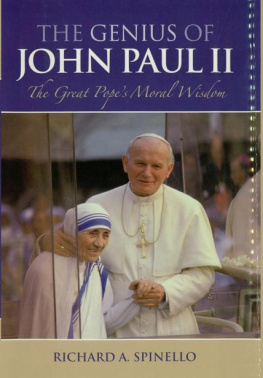
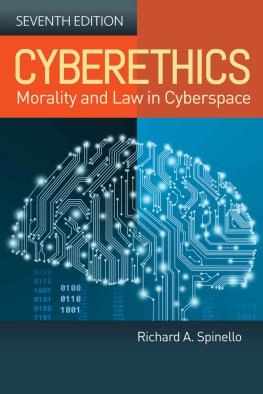

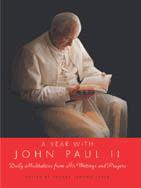
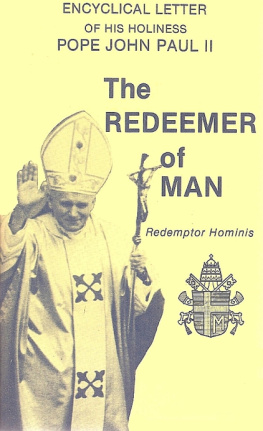
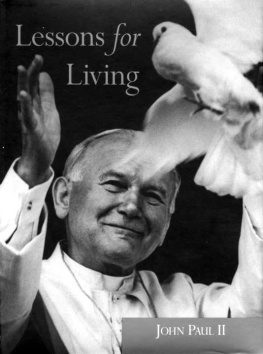
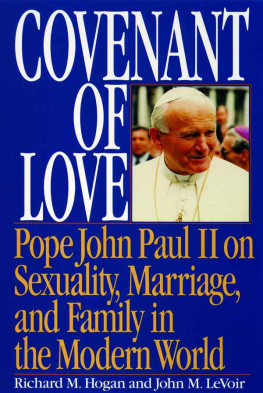
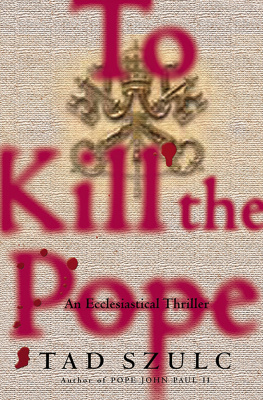
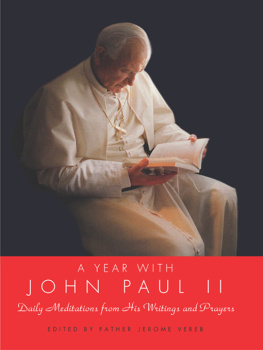


 The paper used in this publication meets the minimum requirements of American National Standard for Information SciencesPermanence of Paper for Printed Library Materials, ANSI/NISO Z39.48-1992.
The paper used in this publication meets the minimum requirements of American National Standard for Information SciencesPermanence of Paper for Printed Library Materials, ANSI/NISO Z39.48-1992.